The number one expense on The World by Road is fuel. To date, we have spent somewhere in the neighborhood of $23,000 on fuel. We thought that Africa was going to be cheap, and compared to Europe, it is, but it is still fairly expensive to fill up here in west central Africa. As a result of the higher fuel prices we have been encountering in Africa, we were looking forward to making it into Nigeria where we heard that gas is relatively inexpensive.
Gas is cheap in Nigeria costing only about $2.25 per gallon compared with prices that exceed $5 per gallon in neighboring countries, but in order to get gas in Nigeria at $2.25 a gallon, you must pay another price: a huge commitment of your time. I would estimate that over 90 percent of the gas stations we passed in Nigeria were either abandoned, shut down, or out of fuel. When you do come across a gas station that is open and has fuel in it’s pumps, you are forced to wait in excruciatingly long lines. Sometimes, the wait for fuel at a service station can occupy three or four hours of your day.
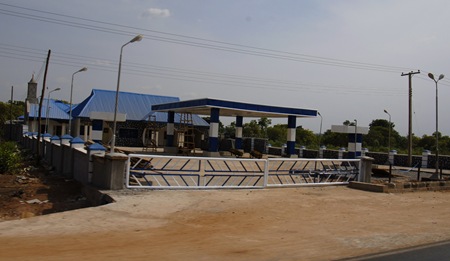
One of the countless closed service stations we passed in Nigeria
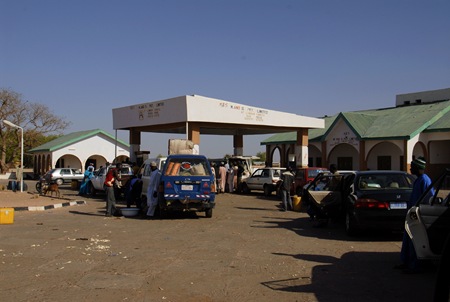
People wait for fuel at one of the few open stations near Gusau, Nigeria
Nigeria is the number six producer of oil in the world, but most of the oil that is pumped from Nigeria’s territorial waters is exported. Despite its position as an OPEC heavyweight, Nigeria is forced to import gas to meet it’s domestic demand. Refining capacity in Nigeria is almost nonexistent and the refineries that are operating in the country are run by the government which even admits that they are poorly managed, inefficient and plagued by maintenance issues.
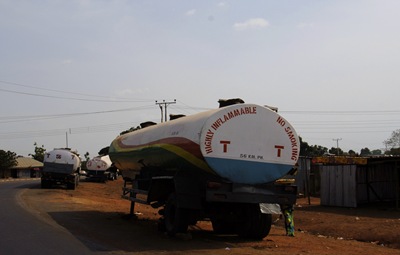
Signs of Nigeria’s dilapidated energy infrastructure
In some regions of the country, like the state of Sokoro, none of the service stations had fuel available, so one is forced to search out fuel on the black market. Sokoro was where we entered Nigeria and we were totally amazed at the fuel situation there. No one had fuel of any type and no one expected to have any for days. One service station was expecting a shipment in two days, and already there was a line of more than 50 cars outside the gate. We obviously did not want to wait for two days for the fuel to arrive and then spend another day waiting in line, so we found some illegal fuel for the trucks at a roadside black market stash.
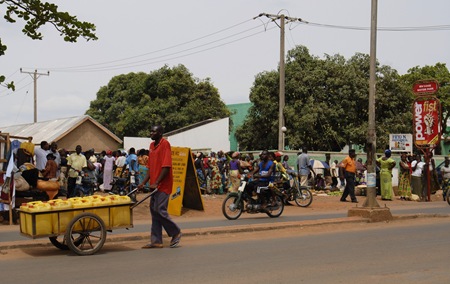
Black market fuel vendor in Zaria, Nigeria
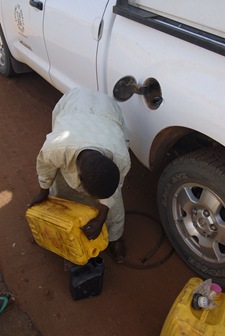
We were not willing to wait so black market fuel it was
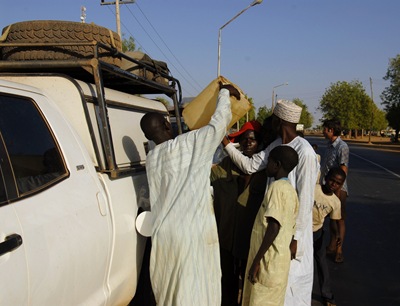
Fortunately for us, black market fuel in Nigeria is still cheaper than legal fuel in other parts of West Africa
Nigeria has a well established black market for fuel and some people’s sole income is derived from selling illegal fuel. Most cities have an organized group managing black market fuel and you can even spot local authorities purchasing fuel from roadside vendors. Because it is black market gas, you can expect to pay more for it. Throughout Nigeria, and depending on the overall availability of legal fuel in a region, you can expect to pay anywhere from 90 to 140 Naira per liter on the black market compared to the fixed price of 70 per liter at a service station. This is a pretty significant price difference, but a difference you are willing to pay when confronted with a seemingly endless line of cars in front of you at the service station. Unfortunately, for many Nigerians, this is a price difference that they can not afford, so they must either find alternative means of transport, or dedicate a large portion of their time to filling up their vehicles at legitimate stations.
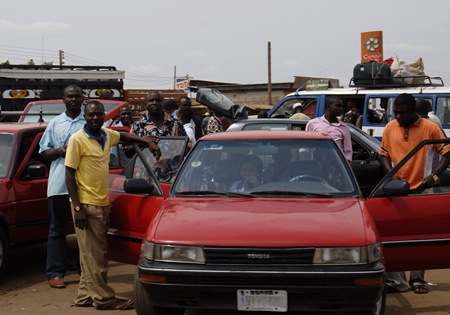
Waiting for fuel in Gboko
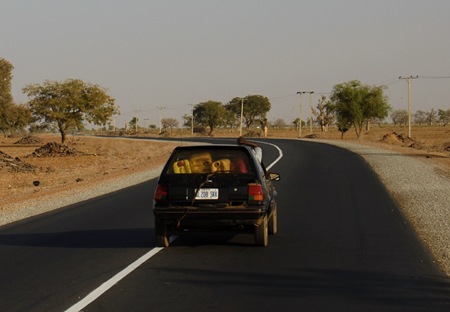
You can make a good living buy legal gas in one state and reselling it for double the price in the next
The situation here is pretty bad and the black market also perpetuates attacks on pipelines and refineries that are operational by rebel groups who sell fuel on the black market to finance their activities. The demand for fuel in Nigeria far exceeds the supply (the power grid is so unreliable in Nigeria that many hotels and businesses run generators which further reduces the available supply) and this is strange coming from a country that has so much oil to go around. If there is one positive, I have one more for the I never game: “I have never bought black market fuel from rebels in Nigeria…”
